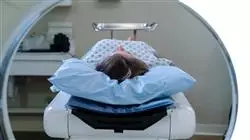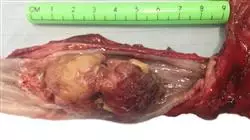University certificate
The world's largest faculty of medicine”
Introduction to the Program
Digestive Oncology is a topic of great importance today. Increase your knowledge in the area with this specific 100% online program"

The relevance of the knowledge acquired in this course for physicians today is undeniable. Tumors in the digestive system are one of the leading causes of death from cancer, which underscores the importance of having professionals trained in the diagnosis and treatment of this disease. Accurate and early diagnosis of digestive cancer can significantly improve the chances of successful treatment and patient survival.
TECH Postgraduate certificate in Diagnosis in Digestive Oncology is a unique opportunity for medical professionals interested in specializing in the diagnosis of tumors in the digestive system. This training program consists of 1 module that focuses on complementary studies in digestive tumors.
This module delves into conventional radiological techniques, nuclear medicine and molecular diagnostics, among other key topics in the diagnosis of digestive tumors. In addition, course participants will have the opportunity to learn about the role of the microbiome in the prevention and early diagnosis of digestive tumors.
The methodology of TECH Postgraduate certificate in Diagnosis in Digestive Oncology is 100% online, which means that participants can study from anywhere and on their own schedule. In addition, the program has a team of highly qualified teachers and updated and relevant learning resources.
Therefore, this Postgraduate certificate in Diagnosis in Digestive Oncology from TECH provides physicians with a complete and specialized training in complementary studies in digestive tumors, which will allow them to plan treatments and make informed decisions in the care of patients with tumors in the digestive system. The knowledge gained may also open up new job opportunities for medical professionals.
By completing this program you will be better prepared to plan treatments and make informed decisions in the care of patients with digestive tumors"
This Postgraduate certificate in Diagnosis in Digestive Oncology contains the most complete and up-to-date scientific program on the market. The most important features include:
- The development of practical cases presented by experts in Oncologic Digestive Surgery
- Graphic, schematic, and practical contents with which they are created, provide scientific and practical information on the disciplines that are essential for professional practice
- Practical exercises where the self-assessment process can be carried out to improve learning
- Its special emphasis on innovative methodologies
- Theoretical lessons, questions to the expert, forums for discussion of controversial issues and individual reflection papers
- Content that is accessible from any fixed or portable device with an Internet connection
You will update knowledge and skills in Diagnosis in Digestive Oncology and provide quality care to patients with tumors in the digestive system"
The program’s teaching staff includes professionals from sector who contribute their work experience to this educational program, as well as renowned specialists from leading societies and prestigious universities.
Its multimedia content, developed with the latest educational technology, will provide the professionals with situated and contextual learning, i.e., a simulated environment that will provide an immersive education programmed to learn in real situations.
The design of this program focuses on Problem-Based Learning, by means of which the professionals must try to solve the different professional practice situations that are presented throughout the academic course. This will be done with the help of an innovative system of interactive videos made by renowned experts.
The genetic study in patients with risk factors for digestive tumors is another key topic addressed in this program"

The 100% online methodology will allow you to study from anywhere and on your own schedule"
Why study at TECH?
TECH is the world’s largest online university. With an impressive catalog of more than 14,000 university programs available in 11 languages, it is positioned as a leader in employability, with a 99% job placement rate. In addition, it relies on an enormous faculty of more than 6,000 professors of the highest international renown.

Study at the world's largest online university and guarantee your professional success. The future starts at TECH”
The world’s best online university according to FORBES
The prestigious Forbes magazine, specialized in business and finance, has highlighted TECH as “the world's best online university” This is what they have recently stated in an article in their digital edition in which they echo the success story of this institution, “thanks to the academic offer it provides, the selection of its teaching staff, and an innovative learning method aimed at educating the professionals of the future”
A revolutionary study method, a cutting-edge faculty and a practical focus: the key to TECH's success.
The most complete study plans on the university scene
TECH offers the most complete study plans on the university scene, with syllabuses that cover fundamental concepts and, at the same time, the main scientific advances in their specific scientific areas. In addition, these programs are continuously being updated to guarantee students the academic vanguard and the most in-demand professional skills. In this way, the university's qualifications provide its graduates with a significant advantage to propel their careers to success.
TECH offers the most comprehensive and intensive study plans on the current university scene.
A world-class teaching staff
TECH's teaching staff is made up of more than 6,000 professors with the highest international recognition. Professors, researchers and top executives of multinational companies, including Isaiah Covington, performance coach of the Boston Celtics; Magda Romanska, principal investigator at Harvard MetaLAB; Ignacio Wistumba, chairman of the department of translational molecular pathology at MD Anderson Cancer Center; and D.W. Pine, creative director of TIME magazine, among others.
Internationally renowned experts, specialized in different branches of Health, Technology, Communication and Business, form part of the TECH faculty.
A unique learning method
TECH is the first university to use Relearning in all its programs. It is the best online learning methodology, accredited with international teaching quality certifications, provided by prestigious educational agencies. In addition, this disruptive educational model is complemented with the “Case Method”, thereby setting up a unique online teaching strategy. Innovative teaching resources are also implemented, including detailed videos, infographics and interactive summaries.
TECH combines Relearning and the Case Method in all its university programs to guarantee excellent theoretical and practical learning, studying whenever and wherever you want.
The world's largest online university
TECH is the world’s largest online university. We are the largest educational institution, with the best and widest online educational catalog, one hundred percent online and covering the vast majority of areas of knowledge. We offer a large selection of our own degrees and accredited online undergraduate and postgraduate degrees. In total, more than 14,000 university degrees, in eleven different languages, make us the largest educational largest in the world.
TECH has the world's most extensive catalog of academic and official programs, available in more than 11 languages.
Google Premier Partner
The American technology giant has awarded TECH the Google Google Premier Partner badge. This award, which is only available to 3% of the world's companies, highlights the efficient, flexible and tailored experience that this university provides to students. The recognition as a Google Premier Partner not only accredits the maximum rigor, performance and investment in TECH's digital infrastructures, but also places this university as one of the world's leading technology companies.
Google has positioned TECH in the top 3% of the world's most important technology companies by awarding it its Google Premier Partner badge.
The official online university of the NBA
TECH is the official online university of the NBA. Thanks to our agreement with the biggest league in basketball, we offer our students exclusive university programs, as well as a wide variety of educational resources focused on the business of the league and other areas of the sports industry. Each program is made up of a uniquely designed syllabus and features exceptional guest hosts: professionals with a distinguished sports background who will offer their expertise on the most relevant topics.
TECH has been selected by the NBA, the world's top basketball league, as its official online university.
The top-rated university by its students
Students have positioned TECH as the world's top-rated university on the main review websites, with a highest rating of 4.9 out of 5, obtained from more than 1,000 reviews. These results consolidate TECH as the benchmark university institution at an international level, reflecting the excellence and positive impact of its educational model.” reflecting the excellence and positive impact of its educational model.”
TECH is the world’s top-rated university by its students.
Leaders in employability
TECH has managed to become the leading university in employability. 99% of its students obtain jobs in the academic field they have studied, within one year of completing any of the university's programs. A similar number achieve immediate career enhancement. All this thanks to a study methodology that bases its effectiveness on the acquisition of practical skills, which are absolutely necessary for professional development.
99% of TECH graduates find a job within a year of completing their studies.
Postgraduate Certificate in Diagnosis in Digestive Oncology
Diagnosis in digestive oncology refers to the identification of the presence of malignant tumors in the digestive tract, which groups the set of organs involved in the process of digestion. The diagnosis in digestive oncology is a complex process that may involve several stages and clinical tests to detect and determine the type and stage of cancer. At TECH Global University we have this specialized program designed to provide knowledge on the diagnosis and management of digestive cancer and will focus on addressing the specific challenges faced by health professionals in the diagnosis and treatment of this disease. Participants will be able to develop skills and competencies in the multidisciplinary management of patients with digestive cancer and improve their ability to provide comprehensive and quality care to their patients.
Early diagnosis of digestive cancer is essential to increase the chances of successful treatment. Therefore, it is important to have regular checkups and undergo preventive testing if you have a family history of digestive cancer or experience symptoms such as abdominal pain, unexplained weight loss, diarrhea or rectal bleeding.







